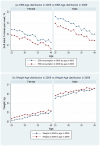Sugar sweetened beverages and weight gain over 4 years in a Thai national cohort--a prospective analysis
- PMID: 24805125
- PMCID: PMC4013004
- DOI: 10.1371/journal.pone.0095309
Sugar sweetened beverages and weight gain over 4 years in a Thai national cohort--a prospective analysis
Abstract
Introduction: Sugar sweetened beverages (SSBs) are implicated in the rising prevalence of obesity and diet-related chronic diseases worldwide. However, little is known about their contribution to weight gain in Asian populations. This study aimed to investigate weight change associated with SSB consumption between 2005 and 2009 in a large national cohort of Thai university students.
Methods: Questionnaire data were collected from a large Thai cohort (the Thai Health-Risk Transition: a National Cohort Study). The analysis was based on responses from 59 283 of the 60 569 (98%) cohort members who had valid SSB consumption and weight variables in 2005 and 2009. The relationship between SSB consumption in 2005 and self-reported weight change was analysed using multiple linear regression models controlled for socio-demographic, activity and (non-validated) dietary factors shown to influence weight.
Results: Higher frequency of SSB consumption in 2005 was significantly associated with greater weight gain between 2005 and 2009 in all age groups and in both sexes (p<0.0001); persons who consumed SSBs at least once a day in 2005 gained 0.5 kg more than those who consumed SSBs less than once a month. The estimated weight gain for the average person in the sample was 1.9 kg (95% C I 1.95-1.96). The difference in weight gain between those who increased their consumption frequency (<once a month to > once per day) between 2005 and 2009 compared to those who maintained it was 0.3 kgs, while persons who reduced their consumption frequency (once a day to > once a month) gained 0.2 kgs less than those whose consumption remained unchanged.
Conclusion: SSB consumption is independently associated with weight gain in the Thai population. Research and health promotion in Thailand and other economically transitioning countries should focus on reducing their contribution to population weight gain and to diet-related chronic diseases.
Conflict of interest statement
Figures


Similar articles
-
Sugar-sweetened beverage consumption and age at menarche in a prospective study of US girls.Hum Reprod. 2015 Mar;30(3):675-83. doi: 10.1093/humrep/deu349. Epub 2015 Jan 27. Hum Reprod. 2015. PMID: 25628346 Free PMC article.
-
Resolved: there is sufficient scientific evidence that decreasing sugar-sweetened beverage consumption will reduce the prevalence of obesity and obesity-related diseases.Obes Rev. 2013 Aug;14(8):606-19. doi: 10.1111/obr.12040. Epub 2013 Jun 13. Obes Rev. 2013. PMID: 23763695 Free PMC article. Review.
-
Reducing consumption of sugar-sweetened beverages is associated with reduced blood pressure: a prospective study among United States adults.Circulation. 2010 Jun 8;121(22):2398-406. doi: 10.1161/CIRCULATIONAHA.109.911164. Epub 2010 May 24. Circulation. 2010. PMID: 20497980 Free PMC article. Clinical Trial.
-
Sugar-sweetened beverages, weight gain, and incidence of type 2 diabetes in young and middle-aged women.JAMA. 2004 Aug 25;292(8):927-34. doi: 10.1001/jama.292.8.927. JAMA. 2004. PMID: 15328324
-
Financial conflicts of interest and reporting bias regarding the association between sugar-sweetened beverages and weight gain: a systematic review of systematic reviews.PLoS Med. 2013 Dec;10(12):e1001578; dicsussion e1001578. doi: 10.1371/journal.pmed.1001578. Epub 2013 Dec 31. PLoS Med. 2013. PMID: 24391479 Free PMC article. Review.
Cited by
-
A Comparative Study of Nutritional Status, Knowledge Attitude and Practices (KAP) and Dietary Intake between International and Chinese Students in Nanjing, China.Int J Environ Res Public Health. 2018 Sep 3;15(9):1910. doi: 10.3390/ijerph15091910. Int J Environ Res Public Health. 2018. PMID: 30177588 Free PMC article.
-
Prevalence of Diabetes and Relationship with Socioeconomic Status in the Thai Population: National Health Examination Survey, 2004-2014.J Diabetes Res. 2018 Mar 1;2018:1654530. doi: 10.1155/2018/1654530. eCollection 2018. J Diabetes Res. 2018. PMID: 29687009 Free PMC article.
-
Soft drink intake is associated with weight gain, regardless of physical activity levels: the health workers cohort study.Int J Behav Nutr Phys Act. 2020 May 12;17(1):60. doi: 10.1186/s12966-020-00963-2. Int J Behav Nutr Phys Act. 2020. PMID: 32398158 Free PMC article.
-
Changes in Eating Behaviours among Czech Children and Adolescents from 2002 to 2014 (HBSC Study).Int J Environ Res Public Health. 2015 Dec 15;12(12):15888-99. doi: 10.3390/ijerph121215028. Int J Environ Res Public Health. 2015. PMID: 26694428 Free PMC article.
-
Consumption of sugar-sweetened beverages and type 2 diabetes incidence in Thai adults: results from an 8-year prospective study.Nutr Diabetes. 2017 Jun 19;7(6):e283. doi: 10.1038/nutd.2017.27. Nutr Diabetes. 2017. PMID: 28628126 Free PMC article.
References
-
- Yoon K-H, Lee J-H, Kim J-W, Cho J, Choi Y-H, et al. (2006) Epidemic obesity and type 2 diabetes in Asia. Lancet 368: 1681–1688. - PubMed
-
- Aekplakorn W, Hogan M, Chongsuvivatwong V, Tatsanavivat P, Chariyalertsak S, et al. (2007) Trends in obesity and associations with education and urban or rural residence in Thailand. Obesity 15: 3113–3121. - PubMed
-
- Aekplakorn W (2011) Report on the Thai National Health Examination Survey 2008–09. Nonthaburi: National Health Examination Survey Office.
-
- Allotey P, Reidpath D, Yasin S, Chan C, Aikins A (2011) Rethinking health-care systems: a focus on chronicity. The Lancet 377: 450–451. - PubMed
Publication types
MeSH terms
Substances
Grants and funding
LinkOut - more resources
Full Text Sources
Other Literature Sources

